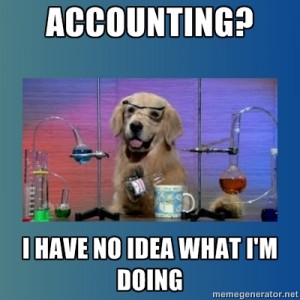The diversity of the tMPA program is impressive. Radio, Television, and Film, Mathematics, Russian Language and Literature majors are sprinkled amidst the Accounting, Finance, and Economics degrees. However, my Chemistry degree was an immediate object of curiosity. Four months ago, the question of why I made the switch from science to accounting was difficult to answer.
Today I’m relieved to say that I’ve almost figured it out, and for those who haven’t heard my reasoning, I’ll explain now. Here’s how chemistry and accounting are more alike that you might think:
1) Chemistry is all about research. Data collection and analysis, not to mention designing experiments, drives the daily life of any scientist. Modern accounting is strikingly similar. The intuition that I developed over the four and a half years I spent as a chemistry major transfers very neatly to accounting, especially auditing.
2) Scientists understand that numbers aren’t just numbers; every digit you see printed on a page relates back to something actually happening in the physical world. So when I look at an account on the balance sheet or income statement, I can see what transactions and business processes went into making that number. This helps take the abstraction out of accounting and make it more relatable.
This is all very well and good, but it only answers the question of how chemistry related skills relate to accounting. But why did I choose accounting? Chemistry was lacking a couple of things that I discovered were very important to me in a job.
1) Chemistry is not an inherently social profession. But accounting is. Especially as an auditor, you have to build strong relationships in order to do your job well. This includes the team you work with, your clients, your pool of potential clients, non-accounting experts, and regulators. The challenges and opportunities that this presents fascinate and energize me.
2) The questions you tackle in research can take longer than several researchers’s lifetimes to answer. For me, this was stifling. In contrast, accounting is extremely dynamic and operates on a much shorter cycle. You will see a wide variety of industries, sizes of clients, and business models and will have to find personalized solutions for each one. This is another incredibly exciting piece for me.
It makes a lot more sense than you might think at first. Next time I’ll talk about what it was like to go through recruiting with a non-business background and my observations on success.


